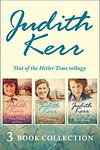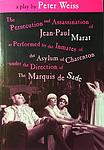The Greatest German "Drama, Fiction" Books Since 1950
Click to learn how this list is calculated.
This list represents a comprehensive and trusted collection of the greatest books. Developed through a specialized algorithm, it brings together 300 'best of' book lists to form a definitive guide to the world's most acclaimed books. For those interested in how these books are chosen, additional details can be found on the rankings page.
Genres
Drama is a genre of literature that typically deals with serious and emotional themes, often exploring the complexities of human relationships and the struggles individuals face in their lives. These books often feature intense character development and intricate plotlines, delving into the depths of human experience and the challenges of navigating the world around us. From family dramas to political intrigue, the drama genre encompasses a wide range of stories that aim to captivate readers with their raw and powerful storytelling.
Countries
Date Range
Reading Statistics
Click the button below to see how many of these books you've read!
Download
If you're interested in downloading this list as a CSV file for use in a spreadsheet application, you can easily do so by clicking the button below. Please note that to ensure a manageable file size and faster download, the CSV will include details for only the first 500 books.
Download-
1. The Book Thief by Markus Zusak
Set in Nazi Germany during World War II, the novel follows the story of a young girl who finds solace in stealing books and sharing them with others. In the midst of the horrors of war, she forms a bond with a Jewish man her foster parents are hiding in their basement. The story is narrated by Death, offering a unique perspective on the atrocities and small acts of kindness during this period. The girl's love for books becomes a metaphor for resistance against the oppressive regime.
-
2. The Reader by Bernhard Schlink
"The Reader" is a poignant narrative centered around a young German boy's complex relationship with an older woman, who later turns out to be a former Auschwitz guard. Their relationship begins with her teaching him to read, but takes a drastic turn when she disappears, only to reemerge on trial for war crimes. The novel explores themes of guilt, shame, and redemption, as the boy, now a law student, grapples with his feelings for a woman he once loved, but whose past actions he cannot reconcile with.
-
3. A Legacy by Sybille Bedford
"A Legacy" is a historical novel that captures the social and political turmoil of early 20th century Germany through the eyes of its protagonist. The story follows a young woman who hails from two distinct families, one being a wealthy Jewish family from Berlin and the other, an aristocratic Catholic family from rural Germany. The narrative provides a detailed account of the protagonist's life, her family's eccentricities, and the eventual downfall of her families amidst the backdrop of the First World War and the Weimar Republic.
-
4. The German Lesson by Siegfried Lenz
"The German Lesson" is a vivid exploration of the moral and cultural conflicts of World War II, set in a small German village. The story is narrated by a young boy who is tasked by his school teacher with an assignment to write an essay on "The Joys of Duty." As his father, a local police officer, is assigned the duty of preventing a popular local artist from painting, the boy finds himself torn between his father's rigid adherence to duty and his own growing appreciation for art and individual expression. The narrative grapples with themes of duty, obedience, and the power of art, providing a thoughtful examination of life under the Nazi regime.
-
5. Jacob the Liar by Jurek Becker
Set during the Holocaust in a Jewish ghetto in Poland, the novel revolves around a man named Jacob who fabricates the news of the Russian Army's advancement to uplift the spirits of his fellow prisoners. However, as his lies gain traction, they become a beacon of hope for the desperate people in the ghetto, leading to unforeseen consequences. The book explores themes of hope, despair, and the power of words, ultimately questioning the morality of lying for a greater good.
-
6. Dog Years by Günter Grass
"Dog Years" is a novel set in Germany during the rise and fall of the Nazi regime and the aftermath of World War II. The story is told from the perspectives of three friends: Walter Matern, a fervent Nazi supporter; Eduard Amsel, a Jewish artist who creates scarecrows; and Harry Liebenau, who narrates their stories. The novel explores the complexities of friendship and identity amidst the backdrop of war, guilt, and redemption. It also delves into the psychological impact of the Holocaust on German society and the struggle to come to terms with its horrific past.
-
7. Couples, Passersby by Botho Strauß
"Couples, Passersby" is a collection of short stories that explore the complexities of human relationships and the subtleties of everyday life. The stories are set in various locations, from urban landscapes to rural settings, and feature a wide range of characters, from couples to solitary individuals, each grappling with their own internal struggles and external circumstances. The author's evocative prose and keen observations of human behavior offer a poignant and insightful look at the human condition.
-
8. When Hitler Stole Pink Rabbit by Judith Kerr
"When Hitler Stole Pink Rabbit" is a poignant and autobiographical novel that follows the life of a young Jewish girl named Anna and her family as they flee Germany in the 1930s to escape the rise of the Nazi regime. Through Anna's eyes, the book explores the challenges and hardships faced by refugees, as well as the loss of identity and sense of belonging. It is a touching story of resilience, courage, and the power of family bonds in the face of adversity.
-
9. Marat Sade by Peter Weiss
The play is a dramatic exploration of power, class struggle, and human suffering set within the confines of an insane asylum in 1808 France. It depicts the Marquis de Sade as an inmate directing his fellow patients in a play about the assassination of Jean-Paul Marat, a radical journalist and politician during the French Revolution. The work delves into the philosophical and political debates between Sade and Marat, representing differing views on revolution, freedom, and the nature of humanity. As the inmates perform, the line between performance and reality blurs, creating a provocative and chaotic theater experience that challenges the audience's perception of madness and reason.
-
10. Die neuen Leiden des jungen W. by Ulrich Plenzdorf
This novel tells the story of a young man from East Germany who rebels against the societal norms and expectations of his time. The protagonist, a skilled worker, flees from his apprenticeship and his home to Berlin, where he isolates himself in a summer house, devoting his time to his passions of reading and listening to Western music. Using the narrative style of a psychological confession, the book explores themes of youthful rebellion, the search for identity, and the conflict between individual desires and societal pressures. The protagonist's tragic end underlines the oppressive nature of the East German regime.
-
11. The Flounder by Günter Grass
The book is a rich tapestry of historical fiction and magical realism, weaving together the lives of a talking fish, a series of women cooks, and the men in their lives over several centuries. It explores themes of feminism, power, and the evolution of culinary arts, with the titular flounder serving as a guide and witness to the unfolding human drama. The narrative spans from the Stone Age to the modern era, reflecting on the changing roles and relationships between men and women, as well as the impact of these dynamics on culture and society. The novel is a blend of myth, satire, and allegory, presenting a unique perspective on the history of humanity through the lens of food and gender politics.
Reading Statistics
Click the button below to see how many of these books you've read!
Download
If you're interested in downloading this list as a CSV file for use in a spreadsheet application, you can easily do so by clicking the button below. Please note that to ensure a manageable file size and faster download, the CSV will include details for only the first 500 books.
Download









